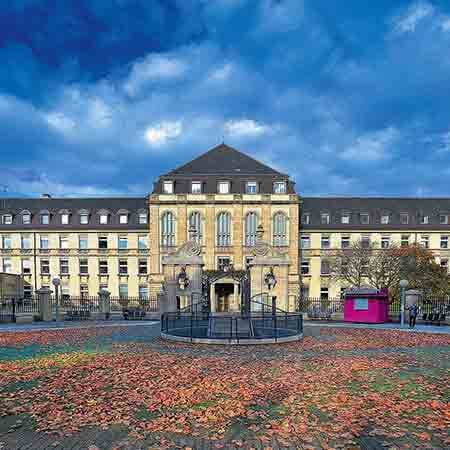Non-Hodgkin Lymphoma
Due to the difficulties associated with the organization of treatment in Turkey, Switzerland, South Korea and India, we are not currently processing requests to these regions.
If you are interested in treatment in Germany, please leave a request and our specialists will contact you as soon as possible.
Non-Hodgkin lymphomas are a group of oncological diseases . The tumor grows from the lymphoid tissue. It includes all the pathologies of the group except for lymphomatoid granulomatosis (Hodgkin’s lymphoma). This is a highly widespread group of illnesses that counts up to 4-4.5% of all malignant formations. Non-Hodgkin lymphoma incidence is 20 cases per 100.000 people a year. 95% of patients are adults and 5% are children.
The Booking Health portal presents 60 German clinics specializing in non-Hodgkin lymphoma treatment
Show all clinics
Non-Hodgkin lymphoma – Diagnostics
Diagnostics of Non-Hodgkin lymphomas is based on the laboratory and instrumental examination methods. It has three basic purposes, such as:
- Establishment of the diagnosis
- Assessment of the pathological process extension (staging)
- Definition of the risk group (for prognosis assessment and determination of the optimal therapeutic tactics)
The lymph node or tumor tissue biopsy is performed in order to establish the nosological diagnosis of the non-Hodgkin lymphoma. Further, its immunohistochemical and morphologic examination is performed.
Imaging methods, such as CT (computed tomography), MRI (magnetic resonance imaging) and ultrasound examination are used to define the tumor mass. Other examinations are also prescribed depending on the tumor localization. If the GIT (gastrointestinal tract) is affected, the EGD (fibrogastroduodenoscopy) is prescribed.
Based on the analyses results, the stage of the non-Hodgkin lymphoma is established. There are 4 stages of this disease, such as:
- Stage 1 – one group of the lymph nodes or one extra-nodal section (organ) is affected.
- Stage 2 – several groups of lymph nodes located on the same side of the diaphragm are affected OR one of the extra-nodal regions with the regional lymph nodes located on the same side of the diaphragm are involved.
- Stage 3 – several lymph nodes groups on the different sides of diaphragm are involved and the process is accompanied by the spleen and extranodal regions lesion.
- Stage 4 – the lymph nodes on the both sides of the diaphragm are affected, the bone marrow is affected and the tumor is present in the extra-nodal regions with metastases into the distant lymph nodes.
Each stage can be:
- A – without intoxication
- B – with intoxication (10% weight loss during the last 6 months, heavy night sweats, fever higher than 38 degrees)
Lesion of the extra-nodal and nodal regions (liver, lungs, bone marrow, spleen, pleura, skin, bones) is also used for the diagnosis establishment.
Best clinics for the non-Hodgkin lymphoma diagnostics in Germany:
Non-Hodgkin lymphoma – Treatment
The purpose of a treatment of some types of non-Hodgkin's lymphomas may be a complete cure of a patient (aggressive types of lymphomas), but in most cases therapy is aimed at achieving the remission and prolonging its duration.
Basic treatment methods are:
- Chemotherapy
- Immunotherapy
- Radiation therapy
Surgical treatment is performed quite rarely. The surgery is performed occasionally if the primary focus of non-Hodgkin lymphoma is located in the spleen, thyroid gland or the stomach. But during the recent years the preference in the treatment of isolated forms of this disease is more and more often given to the radiation therapy.
Stem cells transplantation is prescribed in the case of bone marrow lesion. Allotransplantation (donor’s stem cells) as well as the autotransplantation (patient’s own stem cells) can be performed. Allotransplantation is considered to be more effective although it is more dangerous for the patient.
Non-Hodgkin lymphoma – Innovative treatment
A vaccine for non-Hodgkin lymphoma treatment – BiovaxID. It stimulates the immune system in order to destroy the tumor cells. Trials have shown that the vaccine allows to prolong the remission period for one year on average in the patients with the follicular lymphoma after the chemotherapy. Clinical trials of the BiovaxID are still ongoing.
Targeted therapy. Medications that destroy the tumor cells and have minimal impact on the healthy tissues are being already used for the non-Hodgkin lymphoma treatment.
The following drugs are used for this purpose:
- Proteasome inhibitors
- HDAC inhibitors
- Kinase inhibitors
New approaches to the stem cells transplantation. There is a high risk of re-inserting tumor cells into the bone marrow during the autotransplantation. Monoclonal antibodies are used to reduce this possibility. Antibodies help to get rid of the lymphoma cells from the stem cells culture before last ones are transplanted to the patient.
Best clinics for the non-Hodgkin lymphoma treatment in Germany:


Non-Hodgkin lymphoma – Rehabilitation
Most patients require rehabilitation after the treatment of complex oncological diseases. It includes the following aspects:
- Prevention of complications that may occur as a result of treatment. It can be pneumonia, lymphostasis, thromboembolic or infectious complications.
- Restoration of general health. The elimination of the consequences after surgeries and chemotherapy is carried out. The functions of internal organs are restored with the help of various medical and rehabilitation measures.
- Restoration of occupation. A person must not just stay alive. He must have physical and intellectual capabilities, which are sufficient for employment.
- Psychological support. First of all, it is required for patients, whose occupational performance was harmed because of the disease. Patients with deterioration of appearance also will benefit from psychological help.
- Restoration of appearance. If necessary, you can use surgical and other methods in Germany to restore appearance defects caused by cancer. For example, to carry out the reconstruction of the breast.
- Social and domestic rehabilitation. A person with reduced workability is trained to act in the society and perform everyday tasks in new conditions.
In German clinics, rehabilitation is carried out in a comprehensive manner. The patients are provided with qualitative care here. Doctors' monitoring and conservative treatment allow to avoid complications, which usually happen after treatment of oncological diseases. Psychotherapy, physiotherapy and physical therapy are actively used in Germany.
Specialists in different medical spheres take part in the rehabilitation process. These are massage therapists, speech therapists, specialists in physiotherapy exercises, physiotherapists. Social and occupational therapy is carried out, as well. If necessary, people are taught how to eat properly, take care of a colostomy or urostomy, etc.
In Germany, rehabilitation is carried out with the maximum level of comfort for the patient. A person feels the results quite quickly and it improves his motivation and promotes further recovery.
Best clinics for oncological rehabilitation in Germany:
Author:
The article was edited by medical expert, board certified Dr. Nadezhda Ivanisova. For the treatment of the conditions referred to in the article you must consult a doctor; the information in the article is not intended for self-medication!
Sources:
European Society for Medical Oncology
The cost of services includes
Here you can find the cost of treatment for this disease at the German University Hospitals. Leave a request and we will provide a free consultation with a doctor and will start organizing the whole treatment process.
The program includes the following:
- Issuing of an invitation for getting a visa for treatment as quick as possible
- Fixing an appointment at a time convenient for you
- Preliminary organization of a comprehensive examination and discussion of the forthcoming treatment plan
- Arranging transfer from the airport to the hospital and back to the airport
- Provision of interpreting services and services of a personal medical coordinator
- If necessary, assistance in the organization of further surgical treatment
- Provision of a medical insurance against treatment complications covering up to 200,000 euro
- Preparation and translation of medical records and recommendations from the hospital
- Assistance in the subsequent communication with your attending physician, including consultations on repeated X-ray images through the unique medical document management system E-doc



